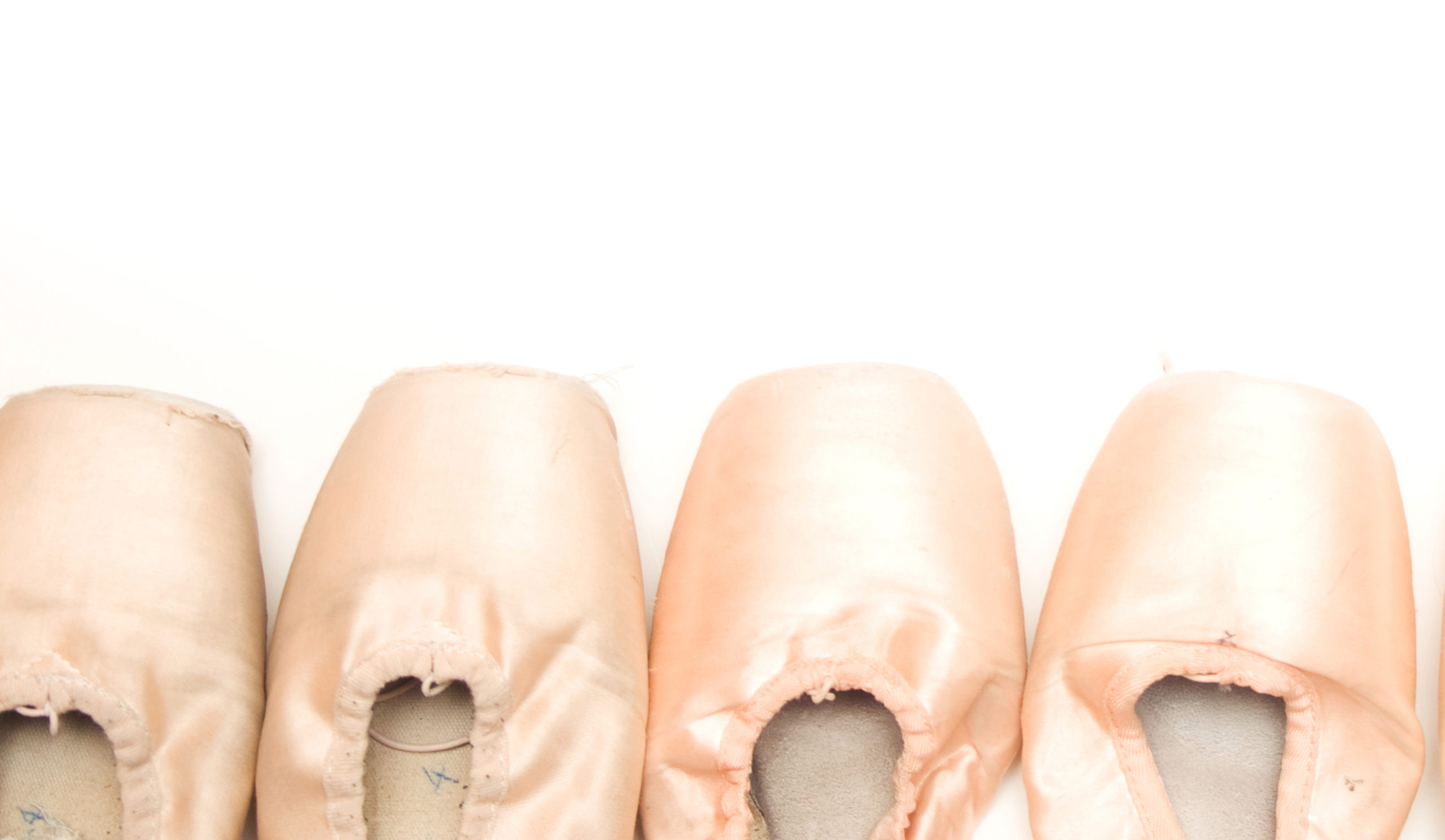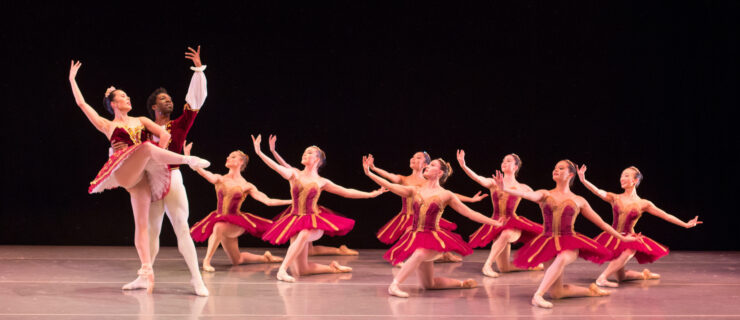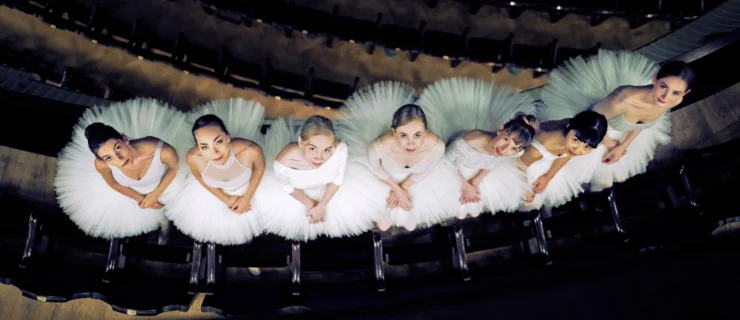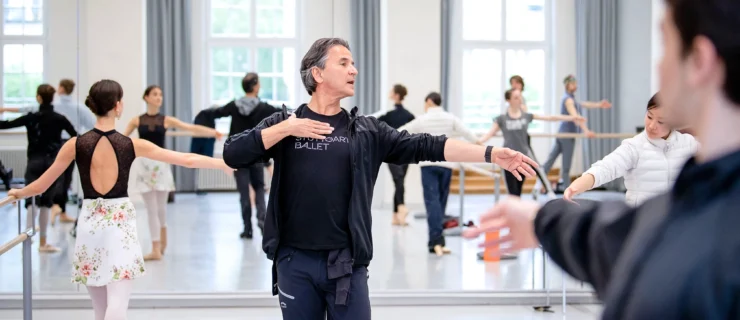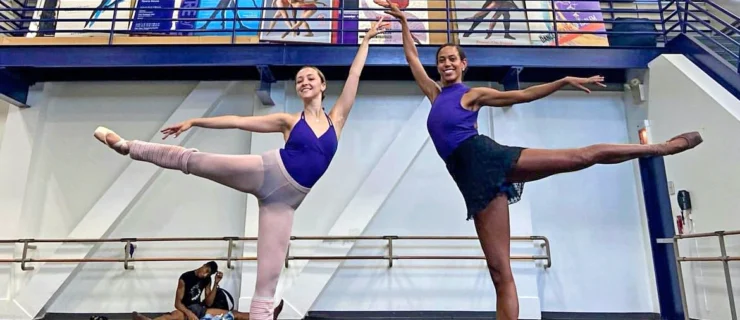Enterprising Men
What you might not know about some of America’s leading male dancers might surprise you. Rasta Thomas, Desmond Richardson, Damian Woetzel and Julio Bocca have all reached the top of their field earning accolades from audiences and critics alike. What they are achieving offstage is equally interesting and impressive.
The Entrepreneur
Rasta Thomas has always charted his own course in the dance world. Recognized early as a dance prodigy, he took the competition world by storm during his teenage years, winning in Paris, Jackson and Varna. He’s performed with many of the world’s dance companies (recently as a guest artist with American Ballet Theatre in the title role of Lar Lubovitch’s Othello this summer), on Broadway in Movin’ Out and in the Patrick Swayze film One Last Dance.
Although he’s just 26, Thomas is now exploring the next phase of his career. “There’s a hard reality that when you can’t dance anymore, if you don’t prepare, there are only a couple options to fall back on,” he says. “I believe in having options and taking initiative.”
As a result, he has started a group called Bad Boys of Dance, which had its debut at Jacob’s Pillow Dance Festival in July. Thomas’s long-term vision for Bad Boys is to have 30 dancers—all men—and 30 choreographers on board. His goal is to spotlight male dancing. “If we can get the ball rolling, it would be a wonderful opportunity to set a bar for what male dancing can be in America today,” he says.
He’s also launching an online dance competition, called DIVA (Dance International Video Awards, www.divacompetition.com). Capitalizing on the ease of uploading video to the internet, a select group of experts will judge dancers by their online video entries. “This is the perfect opportunity for someone in Cuba or Russia or even someone in America who can’t get to New York to put their video online and reap the benefits,” says Thomas. Winners will earn cash awards and titles.
In March, Thomas married dancer Adrienne Canterna (with whom he danced in the USA International Ballet Competition in 1998), and the couple is expecting a daughter in October. Thomas is considering directing and dancing with CityDance, a full-time company based near his home in the Washington, DC area. “While there are a couple of companies I’d love to guest with and choreographers I’d love to collaborate with, I want to put some attention into building something,” he says. “The dancers I admire—from Baryshnikov to Tetsuya Kumakawa to Nureyev—their legacy finished with directing. They set themselves apart from the pack because they were in charge of what they were going to be performing when the curtain went up.”
The Teacher
Desmond Richardson is one of the dance world’s most talented chameleons. He’s appeared on the Metropolitan Opera House stage with American Ballet Theatre and at Madison Square Garden alongside Michael Jackson. He is
as sure-footed on Broadway as in William Forsythe’s complex contemporary ballet or the role of Beowulf in Julie Taymor’s production of the opera Grendel. His film credits include the upcoming Across the Universe, in which he dances and sings, as well as Chicago.
“My mother always said, ‘Learn as much as you can. Try to be a sponge,’” says Richardson. “I like that idea. Whether it be dance or musical theater or film, it’s all a big learning experience.” He’s committed to passing on the knowledge and experience he is acquiring. “To give back is really important,” he says. “What should I do? Just keep all that with me? I’m going to learn as much as I can while I can and then give it back.”
And while Richardson has extensive teaching experience, he recently embarked on a new challenge, working with a community-based organization called the All Stars Project, Inc. He directed and choreographed nine students, none of whom had formal dance training, in Homeland Security: Bringing Dr. King Up-to-Date.
“We explored feeling secure within oneself post-9/11 and what that feels like to the youth of today,” he says. The experimental work, performed in Broadway’s Castillo Theatre in March, combined two of Richardson’s talents often overshadowed by his virtuoso performances onstage—trying something completely new and sharing his creative gifts. “All Stars, that was totally unfamiliar,” he says. “Here I am working with a student-based group, and I’m able to give them something. To me that’s a very beautiful thing.”
Richardson’s talent extends behind the scenes as well. He founded Complexions Contemporary Ballet with choreographer Dwight Rhoden in 1994. The company tours the world, performing an eclectic mix of choreography. Richardson co-directs the troupe and is its star dancer. Although balancing a schedule of guesting, outside gigs and company responsibilities can be a challenge, he finds that the diversity of his projects enhances his experience with his own dancers. “I find so much inspiration that I can give back to the company,” he says.
The Academic
“It was one of those kismet moments,” says New York City Ballet principal Damian Woetzel of his first day as a student at Harvard University’s John F. Kennedy School of Government. “I remember calling my wife, Heather, and saying, ‘It feels just like when I arrived in Manhattan and stood outside Lincoln Center.’”
Woetzel, who started his professional career at 15, was only one of two students admitted without a bachelor’s degree (the other was the governor of Hong Kong). The program starts with a month-long boot camp of intense math and economics. “I loved that,” says Woetzel. “It was so wonderfully challenging. By the fall semester, I felt so confident that I signed up for five courses instead of four.”
He enrolled for two consecutive fall semesters at Harvard in 2005 and segued back into company life each year in time for The Nutcracker.
Woetzel plans on retiring from the stage in the next few years and admits that his future may or may not be in the arts. “To my mind, the idea is to be available for all the different challenges that may come my way,” he says.
In the classroom, national security policy fascinated him, but he’s also interested in the role of the arts in society. “I believe that art is absolutely essential, not a frivolous extra,” he says. “I’m interested in pushing that issue and trying to figure out exactly how it’s essential.”
This summer marked his debut as artistic director of the Vail International Dance Festival. For his first season, he booked Christopher Wheeldon’s new company, Morphoses, as well as Pacific Northwest Ballet in three separate programs. Woetzel’s Vail initiatives include extending company stays so that audiences can cultivate a deeper understanding of the troupes and developing a partnership with the Bravo Vail Valley Music Festival to incorporate live music into the performances.
Woetzel turned 40 in May, often a difficult milestone for a dancer. “It’s a great moment for me,” he says. “I’m 40, and I’m graduating with a master’s from Harvard. I’m still dancing, I’m running this wonderful festival in Vail. It feels great to be 40.”
The Director
From a poor childhood on the outskirts of Buenos Aires to a celebrated career as a principal dancer at American Ballet Theatre, Julio Bocca has had an enviable career. But he hasn’t limited himself to classical dance, nor has he rested on his considerable laurels as a performer. Bocca has given Argentinean dancers and artists opportunities and exposure through the company he founded and directs, Ballet Argentino.
Invited by Baryshnikov to join ABT in 1986 after he won the Moscow International Ballet Competition, Bocca, with his passionate, virtuoso performances, quickly became an international star. Four years later, at 23, he started Ballet Argentino in part so that he could have complete freedom to dance what interested him. The company has been wildly successful, performing to crowds of 100,000 in Argentina and touring the world.
If it was Bocca’s astonishing feats that captured audiences’ attention early in his career, it has been the developing artistry of a mature performer that has held it. “In order to be an artist, I believe it is important to have that versatility that allows one to go through different styles and diverse roles,” he says, “giving a unique personal mark to each one.”
Directing has also enriched his dancing. “It helped me a lot to understand human nature better, to know that we are not all the same, nor do we all have the same objectives in life,” he says. “Overall, I also learned to observe and reflect—and to express authority without authoritarianism.” He’s also started a dance school in Buenos Aires complete with a foundation to support it and give scholarships.
In Argentina, the source of Bocca’s rock-star celebrity may be the fact that he has always remembered his roots. The company has long incorporated Argentinean tango into a repertoire that is primarily classical and contemporary ballet. “Bocca Tango” has been one of the company’s most successful productions.
Bocca retired from ABT last summer, and in 2007 is on his “Ultimo Tour,” a multi-national goodbye that will culminate in an open-air theater in Buenos Aires on December 22.
